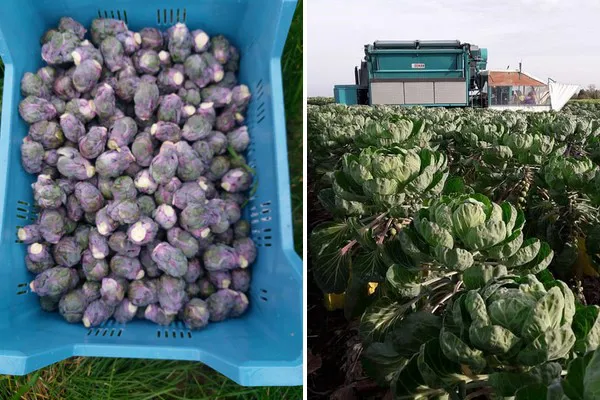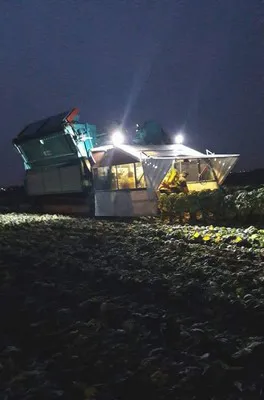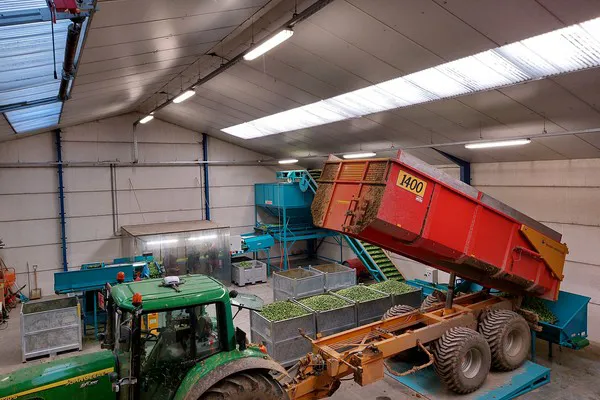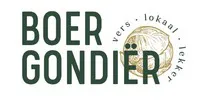In Europe, the challenges facing Brussels sprout cultivation are only increasing. Yet grower Jurgen Santermans remains loyal to the crop. His father was one of the first to plant these in the Gingelom region of Belgium in 1986. "Costs have risen considerably in recent years," he begins.
"So prices should go up considerably, too, but we're still negotiating those. It's becoming increasingly difficult to make a living. Yet, my emotional mind still trumps my rational mind." Jurgen sells most of his Brussels sprouts to the industry and a small portion in his farm store, De Boergondiër.

This is a third-generation cultivation company, with Jurgen being the second generation to grow Brussels sprouts. "We cultivate around 40 hectares of Brussels sprouts annually, much of which goes to the nearby [frozen foods manufacturer] Hesbaye Frost. They process these from late October until about Christmas."
"We also grow peas and large carrots for the industry. We have various vegetables, like purple and flower Brussels sprouts, cauliflower, broccoli, squash, and melons, for the rest of the year. These are, however, more of an out-of-control hobby for sale in our, and some nearby, farm stores," Santermans admits.
Insect pressure
The farm's main staple remains Brussels sprouts, but recently that has been demanding more and more effort from this lifelong grower. "Brussels sprouts are an extremely challenging crop, where one has to be constantly alert. Insect pressure, which has increased significantly, is a major issue. In 2018, it was disastrous due to a cabbage moth infestation. I had to replant a third of the crop, with the rest producing about half as much as in other years."
"Since then, we've started working more closely with local research centers and receive guidance from TACO (Growers Advice Cooperative). Things have improved. They do bi-weekly checks, and we keep a close eye on things. You have to do that because it all affects what happens post-harvest. If you begin treatment two days late, it could already be catastrophic," Jurgen explains.
 Tough negotiations
Tough negotiations
Not only is the cultivation problematic for him; sales are too. "Costs have skyrocketed. Fertilizer prices went through the roof last year, and planting materials are just under ten percent pricier."
"Hourly wages in Belgium are also up ten percent since January. These are undoubtedly significant cost increases, which we obviously have to recoup," Jurgen continues.
"That means our sales prices must rise too, but negotiations with the processing plant are difficult. These prices will probably increase, but I don't know if that will be enough. We'd like to earn something, too, not just offset costs. With current earnings, we cannot invest in, say, a new harvester."
"But, this is where my heart lies. About a decade ago, there were about eight Brussels sprout growers in the area; since last year, there are two of us. The acreage has shrunk. Not ours, but generally. Many growers are switching to other crops, not me, though. I grew up among the Brussels sprouts. Besides, these remain a wonderful Flemish product. My emotions win out over my rationale, but we, too, will have to consider which direction we want to take," Jurgen says.

Niche products
One thing the grower can do is focus more on niche products and own sales. "We'll never abandon the industry, but perhaps we should try to sell more melons and unusual Brussels sprouts. Various wholesalers are already interested in the flower and purple Brussels sprouts. This is currently still a runaway hobby, so it's still too small."
"However, we'll definitely look into this in the future. The same goes for the melons, for which we received very positive feedback last year. The weather was also ideal, and with climate change, I think there's a future in this. My passion lies with the Brussels sprouts, but that doesn't mean I don't keep my eyes open for other opportunities," Jurgen concludes.
For more information: Jurgen Santermans
Jurgen Santermans
De Boergondiër
161 Steenweg
3890, Gingelom, Belgium
Tel: +32 (0) 476 888 088
Email: info@boergondier.be
